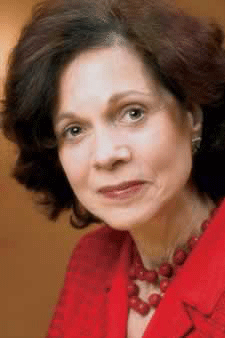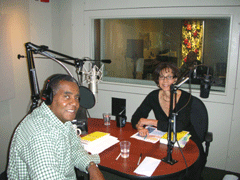Winning the War On Cancer?
Air Date: Week of October 19, 2007

Dr. Devra Lee Davis is Professor of Epidemiology at the University of Pittsburgh's Graduate School of Public Health. (Courtesy of University of Pittsburgh)
While overall death rates from cancer are dropping, the number of new cancer diagnoses is on the rise, especially among children, African Americans and Native Americans. Dr. Devra Lee Davis is the director of the Center for Environmental Oncology at the University of Pittsburgh. She tells host Steve Curwood about her new book “The Secret History of the War on Cancer” and about why cancer rates are increasing.
Transcript
CURWOOD: There’s no news quite like good news, and in recent days we’ve heard the good news that more and more people in America are surviving cancer. Overall cancer death rates are dropping—about two percent a year—and that translates into about 10,000 lives being spared.
But not everyone is part of the good news. Cancer death rates continue to rise for African Americans and Native Americans and the incidence of cancer is rising in the general population. And it’s not just that the U.S. population is aging. Age-adjusted cancer rates still show a rise. The big question is: why? Radiation and many chemicals are known to trigger cancer and this is where the fight should begin, say many scientists, including Devra Davis. She’s the director of the Center for Environmental Oncology at the University of Pittsburgh and has written a new book, “The Secret History of the War on Cancer.” Nice to speak with you again, Dr. Davis.
DAVIS: Thank you so much, Steve.
CURWOOD: In the news we’ve been hearing that the death rates for cancer have been dropping. What does this mean?
DAVIS: Oh it’s great news. It means that fewer white men are smoking. It means that we’re getting better at finding and treating colorectal cancer and breast cancer. But there’s another part of the story that hasn’t been told that we need to be aware of and that is that new cases of cancer—or incidence—have increased for some forms of cancer that have nothing to do with smoking and nothing to do with aging. For example, childhood cancer has increased about 20 percent since 1975 up to 2003. And childhood cancer, after accidents, is the leading cause of death in children.
CURWOOD: So what you’re saying is we’re now seeing more cancer, but fewer people are dying from it?
DAVIS: Well we’re not seeing more cancer even, because we’re not seeing more smoking-related cancer. We’re not seeing, for the first time, more breast cancer. We’re not seeing, necessarily, more colorectal cancer. In those cases, in the case of smoking—because fewer people are smoking, actual rates of cancer are dropping.

Devra and Steve in the studio.(Photo: Emily Taylor)
DAVIS: We have good news about those cancers going down. We have some bad news, though, because they’re not going down equally for everybody.
CURWOOD: Oh?
DAVIS: And the patterns of cancer are much worse for blacks than whites. While one in eight Americans is black, one in two who works in sanitation is black, one in three who works as a bus driver or in a dirty factory job is black, and one in four who lives near a hazardous waste site is black. So when you see the higher burden of cancer for blacks, we have to ask whether they are dietary or environmental factors that might account for it.
CURWOOD: Now where are things not improving or even getting very worse?
DAVIS: Well testicular cancer, I think, is a good example. It’s, unfortunately, the most common cancer in young men. Fortunately, it’s rare. Unfortunately, it’s less rare. Throughout the industrial world today, testicular cancer has increased 50 percent in every country where we’ve looked.
CURWOOD: Why?
DAVIS: One of the theories is that there are things that disrupt hormones and disrupt signals when the testes are developing in utero, or early in life. And that these chemicals or other things that can affect the development of the testes kick in so that when the testes reach its mature growth, in young men in their 20s, that’s when testicular cancer is manifest.

Dr. Devra Lee Davis is Professor of Epidemiology at the University of Pittsburgh's Graduate School of Public Health. (Courtesy of University of Pittsburgh)
DAVIS: Well I was shocked as I started to research this book “The History of War on Cancer,” that in 1936 the world’s leading cancer scientists understood that tobacco caused cancer, hormones caused cancer, x rays caused cancer, solar radiation caused cancer, benzine caused cancer, coal tars caused cancer. Now they knew that in 1936 and I’m not talking about a small, little group. This was the world’s leading experts in the field. And it was fascinating for me to see how the shift of what was considered evidence about cancer causes occurred shortly after this.
CURWOOD: Who decided to use these substances even if science knew that they caused cancer and why?
DAVIS: There was a general lack of information about the causes of cancer except among the very well informed. You have to remember that well into the 1960s and 70s and continuing now with pharmaceutical research, research was done paid for by companies and they owned the research. They could determine when it got published and what got released.
CURWOOD: So what you’re saying is that in certain cases, companies went ahead making and distributing and using these products in full knowledge that they would make people sick.
DAVIS: That is correct.
CURWOOD: So what’s the failure here?
DAVIS: Well I think, as the cartoon Pogo said, the failure is—we’ve met the enemy and it is us. We’re all responsible for this. We had a government that eagerly wanted to believe that industry knew best. We had industry that thought that it could make these decisions and make them in our collective best interest. And we had a public that was not informed and didn’t know enough to ask.
CURWOOD: So what can we do to get the various products and other forms of exposures away from us?
DAVIS: I think we have to take a harder look at what we are doing and I call for a truth and reconciliation commission on toxic hazards.
CURWOOD: So, in South Africa that meant that people came forward and told all the horrible stories and they would not be prosecuted.
DAVIS: I don’t know what the system would look like. I want to put the idea out there for discussion but one of the things it would do, is if companies agreed to come forward with what they know about toxic hazards now, they would be immunized from punitive damages. There’s no incentive for companies to do this right now. The adversarial system isn’t working. There’s in fact incentive for companies not to give us information. If we had a truth and reconciliation commission, if we had a neutral forum where information was provided, that could be independently reviewed, then we’d have a much better opportunity to identify the problems that we can do something about now.
The current system isn’t working. What we are saying increasingly is—particularly in this administration—is that the only way we know something is a cause of cancer in humans is when we have enough sick or dead people accumulated that we can definitively say: ‘they have incurred a risk.’ Think of what that means. What that means is that we are dooming this current generation to getting cancer before we decide to act to prevent future generations from getting less of it. And I think that’s fundamentally wrong.
CURWOOD: Devra Davis’ new book is called “The Secret History of the War on Cancer.” Thank you so much, Dr. Davis.
DAVIS: Thank you, Mr. Curwood.
[MUSIC: Various Artists “Daphne” from ‘1 Giant Leap’ (Palm Records—2001)]
Links
The 2007 report on the status of cancer
"The Secret History of the War on Cancer"
University of Pittsburgh Cancer Institute's Center for Environmental Oncology
Living on Earth wants to hear from you!
Living on Earth
62 Calef Highway, Suite 212
Lee, NH 03861
Telephone: 617-287-4121
E-mail: comments@loe.org
Newsletter [Click here]
Donate to Living on Earth!
Living on Earth is an independent media program and relies entirely on contributions from listeners and institutions supporting public service. Please donate now to preserve an independent environmental voice.
NewsletterLiving on Earth offers a weekly delivery of the show's rundown to your mailbox. Sign up for our newsletter today!
 Sailors For The Sea: Be the change you want to sea.
Sailors For The Sea: Be the change you want to sea.
 The Grantham Foundation for the Protection of the Environment: Committed to protecting and improving the health of the global environment.
The Grantham Foundation for the Protection of the Environment: Committed to protecting and improving the health of the global environment.
 Contribute to Living on Earth and receive, as our gift to you, an archival print of one of Mark Seth Lender's extraordinary wildlife photographs. Follow the link to see Mark's current collection of photographs.
Contribute to Living on Earth and receive, as our gift to you, an archival print of one of Mark Seth Lender's extraordinary wildlife photographs. Follow the link to see Mark's current collection of photographs.
 Buy a signed copy of Mark Seth Lender's book Smeagull the Seagull & support Living on Earth
Buy a signed copy of Mark Seth Lender's book Smeagull the Seagull & support Living on Earth

